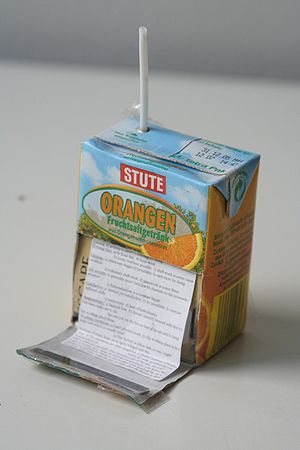| Cheat sheet in a juice box. (Photo credit: Wikipedia) |
The conversations around cheating have taken off since yesterday's post Cheating is Cheating, but why does it happen?
My good friend George Couros nailed one of the key points from my perspective with the comment below. Those of us who have spent any significant time working in schools need to make sure that we have not lost touch with what is happening outside of schools. If we are preparing students exactly the same way as we always have then there is a problem
This morning I was excited to see a blog post from a Paul Huebl, a teacher in Adelaide, Australia who wrote a great post titled Cheating v. Inspiration. While I encourage you to read the entire post, the portion that stuck out for me was where Paul talked about assessments.
"What are we assessing when we give a test? Is it whether a student has good memory? Whether they can apply knowlwedge to a new situation? Whether they can perform well on tests…? I propose that any situation where a child is able to cheat, is not a very good assessment (*most of the time)."Finally my friend Tony Baldasaro shared a story from his first year as a teacher this morning in a post titled One of the Worst Decisions in my Career... . Tony recounts his experience having "no mercy" on a student he caught with a cheat sheet and giving an otherwise top student an insurmountable hole to dig himself out of as one of his veteran colleagues urged him to hold the line.
Again, I am thankful for a PLN with so many lifelong learners (like Tony, Paul and George) who reflect on their practice and are flexible in the interest of students. Tony's question is one that all of us who have ever given a zero to a "cheater" should consider.
"What would have happened if I taught differently, assessed more creatively, and engaged the (student) in the learning in such a way as to emphasize learning and not the grade?"While I know there are many different directions that this conversation can take based on the unique circumstances of individual cases, I think we need to ensure that we are emphasizing learning and not punishments.



No comments:
Post a Comment